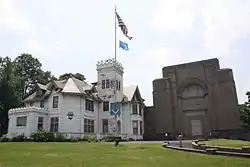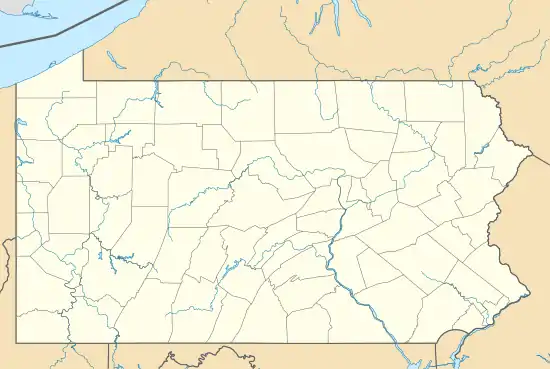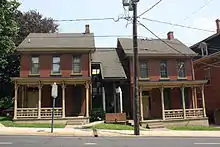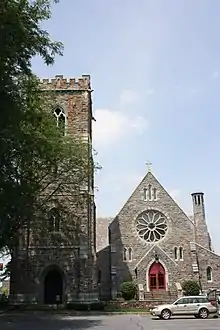Fountain Hill Historic District
Fountain Hill Historic District is a national historic district located at Bethlehem, Lehigh County and Northampton County, Pennsylvania. Despite the name, it is mostly excludes the borough of Fountain Hill, which is an independent municipality located mostly to the southwest of the district. The district includes 44 contributing buildings and 1 contributing structure. The buildings include elaborate, architecturally distinctive mansions, smaller managers' and merchants' dwellings, and public church buildings. The mansions are the focus of the district and include the Linderman / Schwab Mansion (c. 1870), Robert Sayre House (c. 1857), and Elisha Packer Wilbur Mansion (c. 1863). Notable non-residential buildings include the Masonic Temple and Nativity Episcopal Cathedral (c. 1866). The Hill to Hill Bridge is also included in the district. Located in the district is the separately listed Lehigh Valley Railroad Headquarters Building.[2]
Fountain Hill Historic District | |
 Masonic Temple, June 2013. | |
  | |
| Location | Roughly bounded by Brighton, Wyandotte, W. Fourth and Seminole Sts., and Delaware Ave., Bethlehem, Pennsylvania |
|---|---|
| Coordinates | 40°36′40″N 75°23′10″W |
| Area | 33.6 acres (13.6 ha) |
| Architectural style | Late 19th And 20th Century Revivals, Late Victorian, Gothic Revival |
| NRHP reference No. | 88000450[1] |
| Added to NRHP | April 21, 1988 |
It was added to the National Register of Historic Places in 1988.[1]
Gallery
 Robert Sayre Mansion.
Robert Sayre Mansion. William Sayre Mansion.
William Sayre Mansion. Linderman-Schwab Mansion.
Linderman-Schwab Mansion. Edwin Drake House.
Edwin Drake House. Residence on Seneca Street.
Residence on Seneca Street. Residence on West Third Street.
Residence on West Third Street. Nativity Episcopal Cathedral.
Nativity Episcopal Cathedral. Parish Office Hall at Nativity Episcopal Cathedral.
Parish Office Hall at Nativity Episcopal Cathedral. Wilbur Trust and Lehigh Valley Railroad Headquarters.
Wilbur Trust and Lehigh Valley Railroad Headquarters.
References
- "National Register Information System". National Register of Historic Places. National Park Service. July 9, 2010.
- "National Historic Landmarks & National Register of Historic Places in Pennsylvania" (Searchable database). CRGIS: Cultural Resources Geographic Information System. Note: This includes James G. Whildin Jr. and Philip Michael Clark (December 1987). "National Register of Historic Places Inventory Nomination Form: Fountain Hill Historic District" (PDF). Retrieved October 29, 2011.

